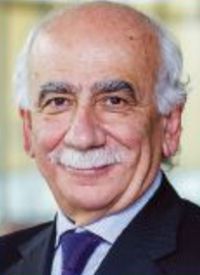Phase 3 Front-MIND Trial Initiated to Explore Tafasitamab Triplet in DLBCL
A phase 3 trial has been initiated to explore the potential of a triplet regimen of tafasitamab-cxix, lenalidomide, and R-CHOP as a treatment options for patients with newly diagnosed diffuse large B-cell lymphoma.
Umberto Vitolo, MD

A phase 3 trial (NCT04824092) has been initiated to explore the potential of a triplet regimen of tafasitamab-cxix (Monjuvi), lenalidomide (Revlimid), and R-CHOP (rituximab [Rituxan], cyclophosphamide, doxorubicin, vincristine, and prednisone) as a treatment options for patients with newly diagnosed diffuse large B-cell lymphoma (DLBCL).
According to an abstract presented by Umberto Vitolo, MD, the director of the Hematology 2 section at University-Hospital in Turin, Italy, presented during the European Hematology Association 2021 Virtual Congress, the triplet may have synergistic potential.1
The Front-MIND study will evaluate the safety and efficacy of the Fc-modified, humanized CD19-targeting monoclonal antibody in combination with lenalidomide and R-CHOP versus tafasitamab plus R-CHOP in patients with previously untreated high-intermediate and high-risk DLBCL. The study will enroll an estimated 880 patients from 350 locations in America, Europe, and Asia.
“Preliminary data from the First-MIND study suggest that tafasitamab plus or minus lenalidomide and R-CHOP is tolerable in patients with treatment‑naïve DLBCL,” study authors wrote in the abstract presented during the meeting. “The phase 3 Front-MIND study will provide further evaluation of clinical benefits and safety in a high-intermediate and high-risk population of patients with newly diagnosed DLBCL.”
To be eligible for the trial, patients must be aged at least 18 to 80 years with previously untreated, local biopsy-proven, CD20-positive DLBCL. Patients must have an international prognostic index (IPI) score of at least 3 if they are aged 60 years or older and an IPI score of 2 to 3 if they are aged 60 years or younger. Patients must also have an ECOG performance score of 0 to 2. Patients with transformed lymphoma will be excluded from the trial.
Patients will be randomized 1:1 based on stratification factors, which include IPI score, disease risk, and geographic region. The experimental arm will be made up of 6 cycles that are 21 days each. Tafasitamab will be administered intravenously at a dose of 12 mg/kg on days 1, 8, and 15. Lenalidomide will given orally on days 1 to 10 at a dose of 25 mg, with R-CHOP given throughout.
The control arm will receive tafasitamab placebo intravenously on days 1, 8, and 15 over the course of six 21-day cycles. Lenalidomide placebo will be given on days 1 to 10. The control group will also be given R-CHOP.
The primary end point of the trial is investigator-assessed progression-free survival. Secondary end points will include investigator-assessed event-free survival and overall survival. Preplanned central nervous system prophylaxis with intravenous high-dose methotrexate will be allowed after response assessment at the conclusion of treatment. Patients have follow-up from their end of treatment visit until the end of the study. Clinical evaluation will occur every 3-6 months, with imaging every 3-12 months, up to 60 months.
In addition, a large set of translational studies are planned, which aim to analyze the relationship between potential biomarkers and efficacy. The approximate duration of the Front-MIND study from the patient’s first visit to last will be 5 years.
In preclinical studies, tafasitamab enhanced in vitro antibody-dependent cell-mediated cytotoxicity and phagocytosis. Tafasitamab plus rituximab and tafasitamab plus lenalidomide were also shown to increase anti-tumor activity vs either single agent alone.
Preliminary safety data from the phase 1b portion of the First-MIND trial were presented at the 62nd Annual ASH Meeting. At the time of analysis, data for 24 patients in the safety run-in phase were available. A total of 137 events were reported for patients in the tafasitamab/lenalidomide/R-CHOP arm (n = 11) and 111 events were reported for the 13 patients in the tafasitamab/R-CHOP arm. Neutropenia grade 3 or higher was observed 46% and 54% of patients, respectively, and grade 3 or higher thrombocytopenia was observed 18% and 8%, respectively. Other events of interest—diarrhea, fatigue and vomiting—were comparable between the 2 arms.2
Investigators reported 23 serious adverse effects: 12 in the triplet arm and 11 in the control arm. No treatment-associated deaths occurred.
Tafasitamab plus lenalidomide was previously examined in the L-MIND study (NCT02399085). The combination was found to be well tolerated and achieved an overall response rate of 55% in 71 patients (95% CI, 43%-67%) with a complete response rate of 37% and a partial response rate of 18%. The median duration of response was 21.7 months (range, 0-24).1,3
Based on these data, in July 2020, the FDA granted accelerated approved for tafasitamab in combination with lenalidomide for the treatment of adult patients with relapsed or refractory DLBCL not otherwise specified, including DLBCL arising from low-grade lymphoma, and who are not eligible for autologous stem cell transplant.3
References
1. Vitolo U, Nowakowski GS, Burke JM, et al. FRONT-MIND: a phase III, randomized, double-blind, placebo-controlled study comparing efficacy and safety of R-CHOP + tafasitamab + lenalidomide vs R-CHOP alone for newly-diagnosed high-risk DLBCL. Presented at: EHA 2021 Virtual Congress; June 9-17, 2021. Abstract PB1451. Accessed June 13, 2021. https://s3.eu-central-1.amazonaws.com/m-anage.com.storage.eha/temp/eha21_abstract_bodies/200930.html.pdf
2. Belada D, Nowakowski GS, Bergua Burgues JM, et al. A Phase Ib, open-label, randomized study to assess safety and preliminary efficacy of tafasitamab (MOR208) or tafasitamab + lenalidomide in addition to R-CHOP in patients with newly diagnosed diffuse large B-Cell lymphoma: analysis of the safety run-in phase. Blood. 2020;136(suppl 1):27-28. doi:10.1182/blood-2020-139788
3. FDA grants accelerated approval to tafasitamab-cxix for diffuse large B-cell lymphoma. FDA. Updated August 3, 2020. Accessed June 13, 2021. https://www.fda.gov/drugs/resources-information-approved-drugs/fda-grants-accelerated-approval-tafasitamab-cxix-diffuse-large-b-cell-lymphoma
Examining the Non-Hodgkin Lymphoma Treatment Paradigm
July 15th 2022In season 3, episode 6 of Targeted Talks, Yazan Samhouri, MD, discusses the exciting new agents for the treatment of non-Hodgkin lymphoma, the clinical trials that support their use, and hopes for the future of treatment.
Listen